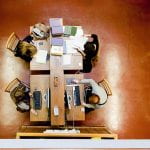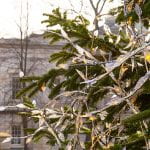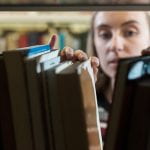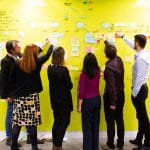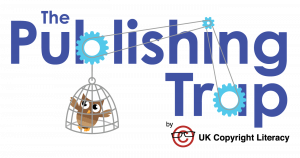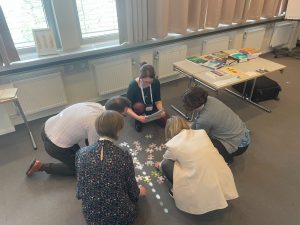Office for Open Science & Scholarship 2025 review
By Naomi, on 12 January 2026

Photograph by Mary Hinkley on UCL imagestore
2026 has well and truly begun, and here in the Office for Open Science & Scholarship (OOSS), we wanted to take a moment to review 2025 and look forward to the year ahead.
As ever, 2025 was a busy year for the Open Access team. They facilitated the Gold open access publication of 4,198 papers, and UCL Discovery continued to expand its reach, with over 66 million downloads. The publications repository now includes almost 200,000 open access items, including 26,400 theses, with over 14,000 uploads throughout the year.
The Research Data Management (RDM) team were also kept very busy in 2025, publishing over 290 items in UCL’s research data repository, which had over 500,000 views and 700,000 downloads during the year. What’s more, 2025 saw the 1 million milestone surpassed for both total views and downloads respectively, which means that a vast number of people have seen, read and benefitted from UCL research thanks to the research data repository.
The RDM team also reviewed over 20 data management plans and led sessions for over 50 people, both online and in person. There is still availability for a couple of sessions this term which can be booked online.
As for the OOSS’s Citizen Science support, 2025 saw the launch of the UCL Citizen Science Support Resources Hub, a comprehensive collection of guidance, tools, and articles to help design and deliver successful Citizen Science projects. We also created the UK-wide Citizen Science Enablers Network, a collaborative initiative bringing together individuals and groups championing Citizen Science within their Higher Education institutions.
Updates and publications
- New version of Research Data Repository User Guide (published October 2025)
- Estimating the prevalence of LLM-assisted text in scholarly writing – Andrew Gray, Bibliometrics Support Officer (published December 2025)
- UCL Citizen Science Support Resources Hub
- New Citizen Science Survey to help shape the support we offer in this area.
Blog Highlights
The blog hosted many insightful and informative pieces throughout 2025, but here are some of our personal highlights:
- ‘Ethics of Open Science: Science as Activism’ by Ilan Kelman, UCL Professor of Disasters and Health – a five-part series which provided a detailed, honest and thought-provoking look at the risks and opportunities of Open Science.
- ‘From Observation to Impact: Exploring Citizen Science Platforms’ by Sheetal Saujani, Citizen Science Coordinator in the Office for Open Science & Scholarship – looking at different Citizen Science platforms and why this technology is vital, with a spotlight on the platform iNaturalist.
- ‘Shaping Tomorrow’s Healthcare: Unlocking the Power of Open-Source AI and Robotics’ by Miguel Xochicale, UCL Senior Research Engineer and a 2023 Office for Open Science & Scholarship award winner – providing an update on the growing movement surrounding open-source software for surgical technologies.
Events

Photograph by Sheetal Saujani
2025 saw our annual Open Science conference re-imagined into the inaugural Open Science Festival which we organised alongside our friends at the Francis Crick Institute and London School of Economics. It was a fantastic week with a wide-ranging programme of events which provided much to mull over and put into practice. Highlights for us included the session on Creativity in Research and Engagement which explored how creative approaches can unlock new possibilities across research, and the session on Authorship in the Era of AI which provided an in-depth panel discussion on the role of large language models in publishing and authorship.

Photograph by Kirsty Wallis
For the third year in a row, the Open Science & Scholarship Awards took place, with 5 categories, 69 submissions, and a wonderful celebration where the overall winner of each category showcased their submitted project. It was a privilege to hear about the brilliant, innovative work happening across different departments to engage with and advance Open Science. As usual, we hosted this awards celebration during International Open Access week, which, along with a blog post each day, prompted us to host a webinar with various speakers from UCL exploring this year’s theme: Who Owns Our Knowledge?
Finally, we hosted a satellite event in November to tie in with OAI14, focused on the theme of Research Infrastructure. A small group attended, watched the conference keynote and discussed the issues surrounding this important subject.

Photograph by Nigel Howe on Flickr
Upcoming in 2026
Turning to the year ahead, we are excited for what’s to come. It will be a significant year for the entire UCL community, as we celebrate 200 years of UCL, and for us in the OOSS, we hope it will be a year of learning, equipping our community and strengthening our connections.
After a brief hiatus, we can’t wait to relaunch our newsletter at the end of January, with news, events and more which we hope you will enjoy – get ready and sign up now! Alongside this, we will be restarting our spotlight series, in which we will interview different individuals who are contributing to open and accessible knowledge. These will be published on the blog throughout the year, so watch this space.
If you’re interested in Citizen Science, we plan to continue building a robust support service this year, one that equips staff and students to deliver meaningful projects and reinforces UCL’s leadership in this field. Why not join our growing online Teams community to connect with colleagues across different departments, share experiences and support each other to help us in this goal. Also, have your say by taking our quick 5–7-minute survey. Your feedback will help us shape practical tools, events, training, and networking opportunities throughout the year and beyond.
After the success of the Open Science Festival last year, we are thrilled to share that 2026 will see an even bigger and better London Open Science Festival, in collaboration with a larger group of brilliant London institutions. This will take place in April, so look out for further announcements on this blog and on our social media accounts.
Lastly, but certainly not least, the Open Science & Scholarship awards have become a regular feature in our calendar and will be another highlight for 2026. A call out for applications will be shared in the summer and we hope to receive even more submissions from across the UCL community!
There will be plenty more along the way, so keep an eye out on this blog, our newsletter, and our Bluesky and Linkedin accounts. Also, please get in touch if there’s anything you would like us to know about, or if you have any enquiries related to Open Science & Scholarship. We will do our best to help or point you in the right direction! Send us an email, our email address is openscience@ucl.ac.uk
The UCL Office for Open Science and Scholarship invites you to contribute to the open science and scholarship movement. Stay connected for updates, events, and opportunities.
Follow us on Bluesky, LinkedIn, and join our mailing list to be part of the conversation!
 Close
Close



























 25 December: From everyone within Research Support at UCL, we hope you have a wonderful Christmas break and we will see you in January 2026! ✨
25 December: From everyone within Research Support at UCL, we hope you have a wonderful Christmas break and we will see you in January 2026! ✨








